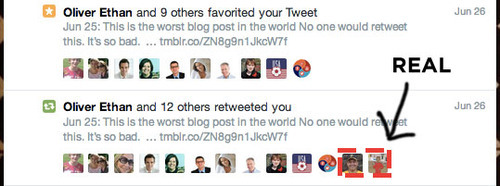I posted a tumblr post and tweeted the link on Twitter. The tumblr post was titled “This is the worst blog post in the world. No one would retweet this.” The post was a target of a Fiverr service I wanted to try out buying retweets. I was interested in a blog post by a data scientist who studied the benefits of buying Twitter followers. His findings was that the followers themselves were useless, but the larger number of existing followers increased the rate at which he accumulated new followers (that were not paid for).

After I posted my experiemental tweet, Wayne retweeted it. Later in the day another co-worker retweeted it. I think theres a lesson here for reverse psychology marketing.

I spent the $5 on a Fiverr service that promised me 100 retweets over 24 hours. I was to expect 10 retweets every hour, until I hit 100. I wasn’t too interested in where the tweets were coming from, but not would have liked to compare retweet-as-a-service offerings.
I noticed that the first retweet came from an “Social Media Marketing” account with over 10,000 followers. The following was a series of accounts with an average of 600 followers/followees. I dont know if this is the sweet spot for fake accounts, but this was definitely the clear average. The accounts were very generic looking people. The majority of posts seemed like randomly generated text snippets with attached links. Interspersed were obviously paid posts that also had ~100 retweets.


Some of the posts seemed very odd. My favorite two were:
 Notice the “favorite”.
Notice the “favorite”.
 Notice no “favorites”.
Notice no “favorites”.
This is the worst blog post in the world No one would retweet this. It’s so bad. … http://t.co/47r8xMjORN
— Leonard Bogdonoff (@rememberlenny) June 25, 2014




